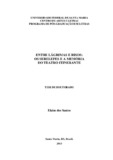| dc.creator | Santos, Elaine dos | |
| dc.date.accessioned | 2013-10-01 | |
| dc.date.available | 2013-10-01 | |
| dc.date.issued | 2013-03-04 | |
| dc.identifier.citation | SANTOS, Elaine dos. ENTRE LÁGRIMAS E RISOS: OS SERELEPES E A MEMÓRIA DO TEATRO ITINERANTE. 2013. 252 f. Tese (Doutorado em Letras) - Universidade Federal de Santa Maria, Santa Maria, 2013. | por |
| dc.identifier.uri | http://repositorio.ufsm.br/handle/1/3984 | |
| dc.description.abstract | This paper presents a study about the traveling theater, doing it on the bias of melodramatic texts represented during the years 1940 to 1980 and that, in actuality, fell in disuse as a result of competition, especially from soap operas. In general, there was a concern to demonstrate that, although the melodrama is considered to be a minor genre, without literary valuation, it follows the Aristotelian precepts that validate it as an aesthetic representation and, therefore, compared it with other artistic -literary manifestations that outlined the so called cultural universe throughout the centuries. More closely, the focus is on melodrama, its origin, critical appreciation, the success of public specially in the years subsequent to its appearance, after the French Revolution and the morality school - opposing good and evil that this genre has always cultivated. Later, the study turned to the Theatre Serelepe, its history, the plays performed, presenting a summary of them to facilitate the analytical approach of this corpus, contextualizing it in the world of literature as a whole (structure, theme, among other aspects). The methodology used was of descriptive and bibliographical nature, relying on scholars that address the dominant themes and description of the plays and activities of the traveling theater. Finally, collaborations and limitations that the traveling theater gave rise to over the years were pointed out, particularly during the period in which the melodramas were the main attraction of their shows, dominated today by farces, comedies, comedy sketches. | eng |
| dc.format | application/pdf | por |
| dc.language | por | por |
| dc.publisher | Universidade Federal de Santa Maria | por |
| dc.rights | Acesso Aberto | por |
| dc.subject | Teatro itinerante | por |
| dc.subject | Melodrama | por |
| dc.subject | Cultura | por |
| dc.subject | Itinerant theatre | eng |
| dc.subject | Melodrama | eng |
| dc.subject | Culture | eng |
| dc.title | Entre lágrimas e risos: os serelepes e a memória do teatro itinerante | por |
| dc.type | Tese | por |
| dc.description.resumo | Este trabalho apresenta um estudo a respeito do teatro itinerante, fazendo-o sobre o viés dos textos melodramáticos representados durante os anos de 1940 a 1980 e que, na atualidade, caíram em desuso, como resultado da concorrência, especialmente das telenovelas. De um modo geral, houve a preocupação em demonstrar que, embora o melodrama seja dado como um gênero menor, sem valoração literária, ele segue preceitos aristotélicos que o validam como uma representação estética e, para isso, fez o cotejamento com outras manifestações artístico-literárias que margearam o universo dito culto ao longo dos séculos. Enfocou-se, mais detidamente, o melodrama, a sua origem, a apreciação crítica, o sucesso de público, sobremodo, nos anos subsequentes ao seu aparecimento, após a Revolução Francesa e a escola de moralidade opondo o bem e o mal que o referido gênero sempre cultivou. Na sequência, o estudo voltou-se para o Teatro Serelepe, a sua história, as peças encenadas, apresentando-se um resumo delas para facilitar a abordagem analítica deste corpus, contextualizando-o no universo da literatura como um todo (estrutura, temática, entre outros aspectos). A metodologia empregada foi de cunho bibliográfico e descritivo, baseando-se em estudiosos que abordam os temas dominantes e a descrição das peças e das atividades do teatro itinerante. Por fim, apontou-se as colaborações e as limitações que o teatro itinerante ensejou ao longo dos anos, principalmente, no período em que os melodramas foram a atração principal de seus espetáculos, hoje, dominados por farsas, comédias, esquetes cômicos. | por |
| dc.contributor.advisor1 | Santos, Pedro Brum | |
| dc.contributor.advisor1Lattes | http://buscatextual.cnpq.br/buscatextual/visualizacv.do?id=K4728603A6 | por |
| dc.contributor.referee1 | Souza Junior, Jose Luiz Foureaux de | |
| dc.contributor.referee1Lattes | http://buscatextual.cnpq.br/buscatextual/visualizacv.do?id=K4780462D1 | por |
| dc.contributor.referee2 | Braga, Claudia Mariza | |
| dc.contributor.referee2Lattes | http://lattes.cnpq.br/3324069492175304 | por |
| dc.contributor.referee3 | Montemezzo, Luciana Ferrari | |
| dc.contributor.referee3Lattes | http://buscatextual.cnpq.br/buscatextual/visualizacv.do?id=K4127964D7 | por |
| dc.contributor.referee4 | Rossini, Elcio Gimenez | |
| dc.contributor.referee4Lattes | http://lattes.cnpq.br/9647159356381511 | por |
| dc.creator.Lattes | http://lattes.cnpq.br/9417981169683930 | por |
| dc.publisher.country | BR | por |
| dc.publisher.department | Letras | por |
| dc.publisher.initials | UFSM | por |
| dc.publisher.program | Programa de Pós-Graduação em Letras | por |
| dc.subject.cnpq | CNPQ::LINGUISTICA, LETRAS E ARTES::LETRAS | por |


